Gaza: Hamas seeks to emerge stronger
- Published
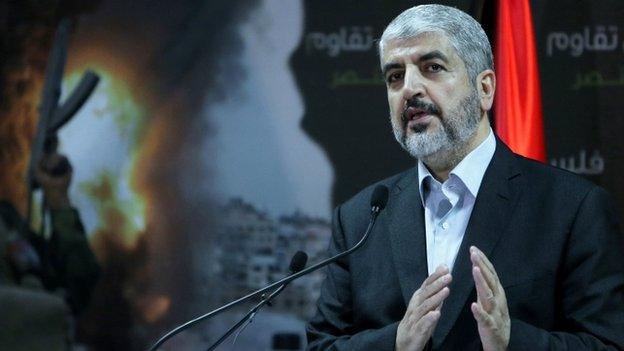
Political bureau chief Khaled Meshaal said Hamas would not agree to a truce until the blockade was lifted
Israel says its military offensive in Gaza targets militants from the Palestinian movement, Hamas. Yet for the most part the Islamist fighters remain shadowy figures during this latest conflict.
In northern Gaza last week, heavy exchanges of gunfire with advancing Israeli ground troops suggested the presence of militants nearby.
However, it was only during Sunday's bloody scenes in Shejaiya, north-east of Gaza City, that journalists saw masked men hurrying down the streets and talking furtively into walkie-talkies on street corners.
The military wing of Hamas, communicates its messages through a spokesman Abu Obeida, who appears on Hamas-run, al-Aqsa television, at intervals to deliver pre-recorded messages with his face wrapped in a kefiya scarf.
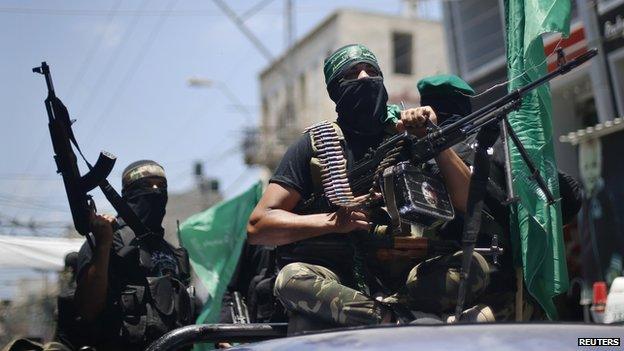
Hamas members are now rarely seen in public, apart from at funerals and rallies
At other times, the TV channel airs details of the latest Israeli attacks and graphic images of the dead, interspersed with propaganda videos showing militants during training exercises, rockets being fired, a new Gaza-made drone and concrete-reinforced tunnels.
There have been occasional televised statements by the former Hamas Prime Minister, Ismail Haniyeh, but most of the Islamist group's officials have gone to ground during this conflict. Their houses tend to be empty when they are targeted by Israeli air strikes.
The only place where we have been able to approach Hamas spokesmen is at the Shifa Hospital in Gaza City where they make periodic appearances.
They consistently demand that any ceasefire deal must include a release of prisoners from Israeli jails and an easing of the border restrictions imposed on Gaza by both Israel and Egypt.
"Until now we are under a complete suffocating siege and embargo. They have isolated Gaza from the world," says spokesman, Fawzi Barhoum. "There's no justification of this crime."
Egypt relations
A blockade of the Palestinian territory was tightened after Hamas seized control of it in 2007, a year after winning legislative elections.
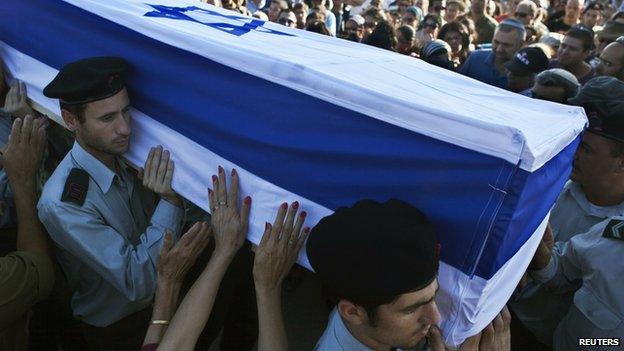
Militants in Gaza have killed more than 25 Israeli soldiers during the latest fighting
Israel sees Hamas as a terrorist organisation; the group's founding charter is committed to the destruction of the Israeli state. Meanwhile Egypt's military-backed governments have always had a testy relationship with Hamas because of its ideological links with the country's Muslim Brotherhood.
Yet Cairo has also played a key role in mediating ceasefire deals. Now it is expected to do so again even though it has implemented its own tough policies on Gaza and relations with Hamas are at an all-time low.
Hamas wants Egypt to reopen fully the Rafah border crossing. It has said it will not stop fighting until there is a full agreement on the table.
Many ordinary Palestinians in Gaza - whatever their political affiliations - support this position. They believe last week's Egyptian proposal based on 2012 ceasefire arrangements offered little.
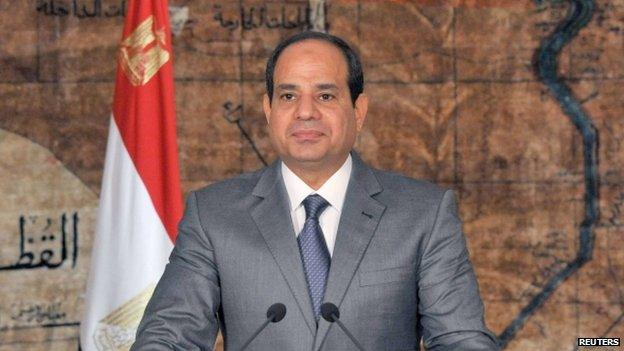
Egypt's new President Abdul Fattah al-Sisi has little trust from the Muslim Brotherhood-linked Hamas
"When Egypt offered the deal, the Israelis picked it up but to be honest for the Palestinians it seemed like a trap," says Ibrahim, from Gaza City. "People want commercial crossings reopened. We want to go back to a normal life."
"We need a ceasefire that will give us our human rights and end the siege," a charity worker, Haneen tells me. "We want the Rafah crossing opened so that we can travel again."
Since the Islamist President Mohammed Morsi was ousted from office a year ago, Rafah, Gaza's main gateway to the world, has been kept shut most of the time.
The Egyptian military has also closed down the network of hundreds of Hamas-licensed smuggling tunnels that ran under its border. These provided a lifeline to the coastal enclave and provided Hamas with vital funds.
The new government in Cairo accuses Hamas of supporting Islamist militants in its restless Sinai region along the Gaza border; a charge it denies.
Longer-term support
The large turnouts for funerals of local Hamas leaders killed in the latest conflict are a reminder of how the Islamist movement still commands wide respect in Gaza, which remains among the most socially conservative Palestinian areas.
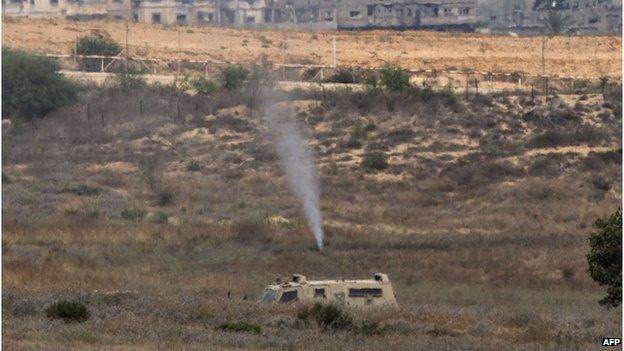
Israel has used gas to clear tunnels it says were dug by Hamas in order to infiltrate Israel
There will also be some in this isolated coastal enclave who are inspired by what will be seen as the achievements of Hamas militants who have killed more Israeli soldiers than in any previous offensives.
The concept of armed resistance against Israel and notions of revenge resonate with certain young Palestinians in Gaza - where the majority of the population are refugees. They have lived through three bloody wars in five years.
However many other Gazans blame the Hamas government for the increasingly difficult circumstances they have found themselves in.
Before the latest violence began, Hamas was in a weak position having fallen out with its regional patrons Syria and Iran during the Arab uprisings only to see ties to Egypt falter.
With serious cash shortages, it was unable to pay the salaries of its 40,000 civil servants in Gaza.
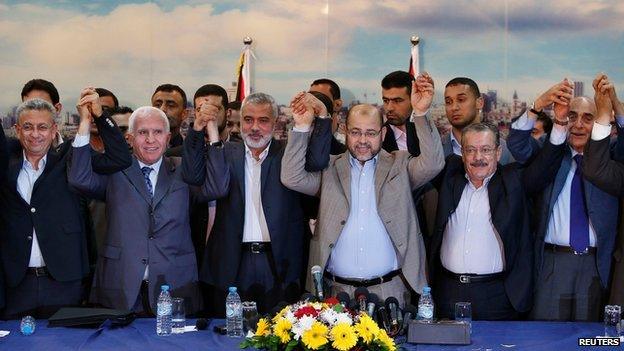
Hamas PM Ismail Haniya (third left) signed a reconciliation deal with Fatah in April
"For nine months we didn't receive a complete salary from the Hamas government even though we continued to work in tough conditions," complained a teacher, Alaa.
Reconciliation deal
The Hamas decision in April to enter into a reconciliation agreement with its political rival, Fatah, and set up a technocratic unity government, was driven by necessity.
While ordinary Palestinians remain very sceptical about the possibility of this government paving the way to general elections as it is supposed to, Gaza could benefit from political infighting being put aside.
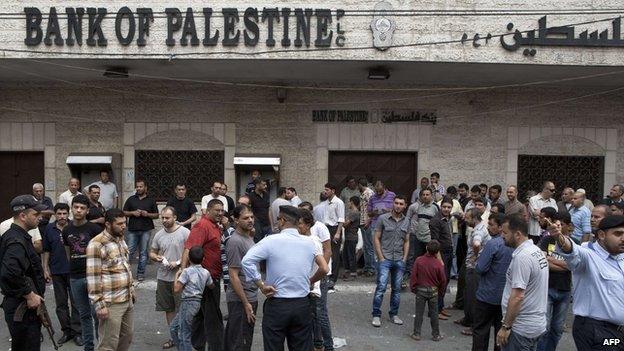
Hamas employees in the Gaza strip complained that their salaries went unpaid in June
The leaders of the different political factions have now accepted the central demands for a ceasefire set out by Hamas and are expected to meet in Cairo soon. This gives them a stronger, joint position to negotiate from.
A Palestinian Authority presence on the Gaza side of Rafah could help satisfy Egypt's requirements for the crossing to be opened.
In the longer-term it remains to be seen whether Hamas can emerge from the latest bout of fighting with Israel with more or less support.
It is hoping that it can take credit for any final comprehensive, long-term deal that will enable it to tell the civilians of Gaza that the hundreds of deaths and widespread destruction were worthwhile.